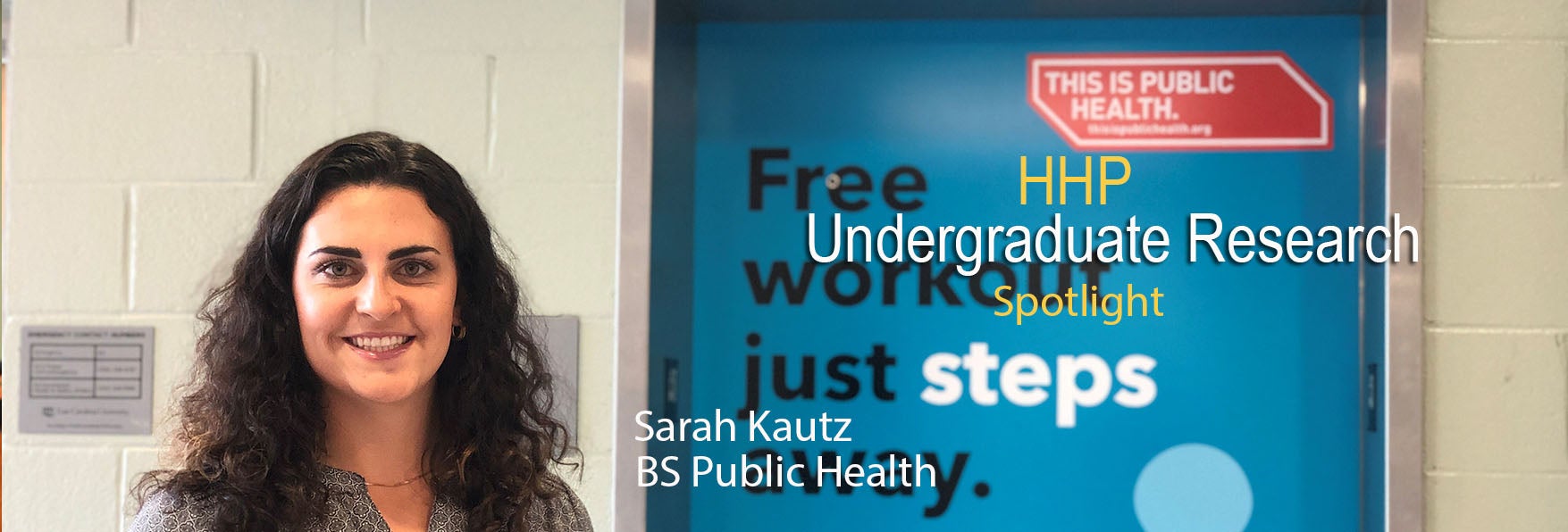Sarah Kautz HHP Undergraduate Research Profile
Name: Sarah Kautz
1. What is your major?
Public Health: Pre-Health Profession Concentration
2. What is your research project?
My project is a type 2 diabetes pilot intervention program aimed at increasing physical activity through leisure time physical activity. To do this participant are asked to set individualized step goals using technology (fitbits) to assist with tracking their physical activity levels over 12 weeks. The first 6 weeks, the active phase, incorporates in-person meetings with myself and all participants in the study. During these meetings we calculate a new step goal based on a 10% increase from their previous weeks average, discuss topics of behavior change (ex: motivation, barriers, self-efficacy), complete worksheets surround reaching topic, and do a “no equipment” exercise. The second 6 weeks, the inactive phase, no longer includes in-person meetings, but participants are still asked to fill out a survey once a week with their average steps per day, and questionnaires addressing their self-efficacy, motivation, and barriers. The purpose of this inactive phase is to see if through the initial active phase participants developed a sustainable behavior change and long-term adherence to increased physical activity levels that can positivity impact the management of their type 2 diabetes.
3. Who are you working with in order to complete this research project?
Dr. Bhibha Das who is an Associate professor in ECU’s Kinesiology department. Dr. Das has been mentoring me on the development and implementation of this project since my freshmen year- working together for about 5 semesters.
4. How did you become involved in the research process?
Dr. Das presented her research interests during my KINE 2000 class my freshmen year. After her presentation, I was captivated by how much her interests in exercise is medicine, preventative care, and public health overlapped with mine. I quickly emailed her hoping to set up a meeting just to hear more about her research. To my surprise she did she so much more than just tell me about her research, she offered to mentor me through the development of own research interests. Since then Dr. Das has been an outstanding mentor and has gone above and beyond to support, challenge, and develop me in becoming not only an undergraduate research but a future health care professional.
5. What advice do you have for students who are interested in your field and want to become involved?
My biggest piece of advice is knowing that no idea is too far-fetched. It is so common for undergraduate researchers to latch on to professors or peers research ideas, which is a great opportunity, but for me personally I am so passionate about my research because it truly stemmed from my own idea. If you have an idea you are passionate about, curious in knowing more, or have an idea that can contribute to your field in a new way- find a mentor who has similar interests and ask for their support in cultivating your idea.
6. How do you think this research process has affected your career path(s)?
I think that my research project is applicable to my future career as a Physician Assistant (PA) in more ways than I realize. But as of now this project has allowed me to develop and implement an intervention program that utilizes exercise as medicine for one of the leading causes of death across the US. Development of this program took critical thinking, creativity, initiative and innovation- all skills that will help me in getting into PA school and my future career. Implementation allowed me to make a positive change in people’s lives right here in Greenville, integrate participant education and manage a team- all things I hope to continue to do as I move closer to my career.
